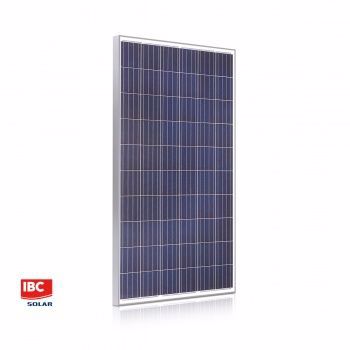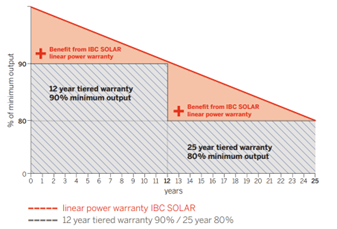PV Systems
Polycrystalline Silicon Cell Array (IBC Solar)
Introduction
A photovoltaic (PV) system is made up of one or more solar panels, an inverter, and other mechanical and electrical components that harness solar energy to produce electricity. PV systems come in a wide range of sizes, from little rooftop or portable units to enormous utility-scale power plants. Although PV systems can function independently as off-grid PV systems, this article concentrates on grid-tied PV systems, which are PV systems that are linked to the utility grid.
The PV systems used for the ROBINSON project's case is a Polycrystalline Silicon Cell Array manufactured in Germany by IBC Solar.
Technical Description

Polycrystalline silicon cells
Polycrystalline silicon cells are selected for the formation of PV arrays, reflecting today's standard PV technology. The two types of PV panels have a maximum power output of 265 Wp and 270 Wp. The panels are manufactured in Germany (IBC Solar). The PV systems chosen had a module efficiency of 16.6%.
More detailed cost information must be received from the PV system provider. Furthermore, life cycle inventory might be developed if significant discrepancies between available life cycle inventory in the eco-invent database and the unique PV system under consideration are predicted. Land usage requirements of roughly 7 m2/kWp are derived from life cycle inventory data available in the eco-invent database. However, no new land is required if panels are put on existing building rooftops.
The CAPEX for the PV has an average cost of 1100€/kWp. The lifetime of the examined PV is 25 to 3- years (Bauer et. al, 2021; Herenčić et al., 2021). The table provides all the economic specifications of the system.
Economic parameters of the PV system. These values are based on literature
|
Cost parameter |
Value |
Unit |
|
CAPEX |
1100 |
[euro/kWp] |
|
REPEX |
1100 |
[euro/kWp] |
|
OPEX |
13-22 |
[euro/kWp/year] |
|
Lifetime |
25-30 |
[years] |
Technology requirements and operating conditions
Eigeroy island has only 22 PV panels, generating a total peak power of 5.94 kW (270 W/panel). EMS simulations will show both the current condition and a more sustainable prime mover upgrade scenario, while scaling up the PV panel surface. IBC Solar panels have module efficiency equal to 16.6%.

IBC Solar PV time efficiency
The warranty presupposes installation un accordance with the valid installation instructions. Standard test condition: 1000 W/m2 irradiation with a spectral distribution of AM 1.5 and cell temperature of 25 °C, 800 W/m2 in NOCT. Information according to EN 60904-3 (STC). All values accord to the DIN EN 50380. The precise conditions and content can be taken from the respectively valid version of the product and power warranty, which you obtain from IBC Premium Partner.

IBC Solar PV, geometry

IBC Solar PV, technical data
